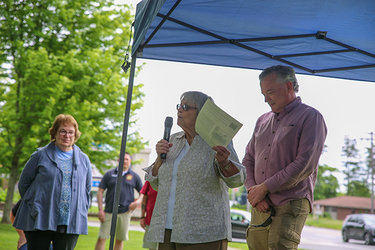McKownville salutes its founder as it plumbs its history
McKOWNVILLE — McKownville celebrated itself on Saturday.
A roadside marker was unveiled for William McKown, who opened a tavern in wide-open space along the Great Western Turnpike in 1803 and for whom the hamlet, now filled with many preserved early 20th Century bungalows, is named.
A picnic followed as residents celebrated the centennial of the McKownville Improvement Association.
Guilderland’s current supervisor, Peter Barber, noted that McKown had served as the town’s supervisor for just over a decade until 1824 and then, 100 years later, the association was formed.
“We’re now here,” said Barber, a century after that.
He noted that, while historic markers are brief, they tell a story.
The newly unveiled marker says: William McKown, 1763 to 1843. Began McKownville building inn, tavern, dam & barns nearby for opening of Great Western turnpike, 1800. Town supervisor 1813-1824.
Barber urged the crowd to go home and learn more.
He also commended John Haluska for his perseverance in restoring Guilderland’s old markers and working to add new ones.
As traffic on Route 20 roared past, the town’s historian, Mary Ellen Johnson, gave a rollicking look at the taverns that one dotted the route.
She hypothesized that McKown’s tavern served as a role model for others.
“He had his tavern up and running the minute the turnpike opened,” Johnson said. “It was a smashing success and lots of people realized, wow this is a good way to make money, and got into it.”
Johnson cited a period reference from the Superintendent of the Turnpike that there were 51 taverns between Albany and Cherry Valley while other estimates go as high as 62.
Animals had to be accommodated with shelter, food, and water as well as people traveling the turnpike, Johnson pointed out.
She noted the language shift from “tavern” to “hotel,” likening it to this modern-day shift: “You don’t buy a used car; you buy a previously owned vehicle,” she said.
By the 1840s, the word “tavern” had fallen out of fashion, Johnson said, replaced by “hotel.”
Johnson consulted an 1854 map of Albany County and found two other hotels on the turnpike in Guilderland, one near today’s Hamilton Square, owned by J. McKown, and the other near the current town hall, owned by F. V. McKown.
Using today’s jargon, Johnson said, William McKown “was an early 19th-Century influencer because he certainly influenced other people to get into the act of tavern-keeping as well.”
William Kidd, a McKownville resident, did much of the research, consulting primary sources to make the historical marker become a reality. He said Johnson’s assessment was correct; many of William McKown’s relatives — “cousins and so on” — got into the tavern business as well.
Kidd read words written by Henry Rowe Sschoolcraft who had lived in Guilderland until he left at age 17. In 1807, Schoolcraft wrote of traveling along the turnpike, coming into the piney woods where “Billy McKown had a noted public house seated halfway between the city and the place where he lived, where it was customary in those days to halt.”
McKown was “much respected and one of the most sensible and influential men in the town,” the passage continued, “and it was not thought right whatever the traveler might require that a horse should be driven eight miles without drawing breath and having a pile of water.”
Kidd noted that all of what McKown had built, even the pond, is now gone.
He also referenced another primary source, an account written about 20 years after Schoolcraft’s by Alexander Coventry, who was a doctor and farmer near Utica.
Coventry wrote in a diary almost every day, said Kidd, and described “arriving at a very large house and extensive tavern establishment.” On inquiry, he found it was William McKown’s, whom he had not seen for the last 30 years.
“I had not seen so crowded a barroom,” he wrote.
“So this was a successful business,” concluded Kidd, “as Mary Ellen said, for about 40 years, the extent of McKown’s lifetime. And then, after that, the trade went away. West Albany rail yards opened up and fewer and fewer travelers came by.”
John McEneny, the Albany County historian, took a nostalgic view of Route 20. He recently traveled the route as he brought his granddaughter home from college in Oneonta.
“I looked at all the little abandoned communities that have names, and there’s almost nothing there,” he said, “because what did them in was not the railroad as much as it was the Thruway. A lot of these little hamlets and villages are no longer there,” he said, their churches unused.
Route 20, he said, was once “the lifeline of New York state.”
McEneny also described how different travel was in McKown’s era. Right after his tavern opened in 1803, he said, “We doubled the size of the country.”
Many people, he said, preferred traveling in winter when the ground was frozen rather than in the spring with “mud everywhere.”
“The other thing we don’t consider is light,” said McEneny.
There were no streetlights and, as Schoolcraft pointed out, you don’t go more than eight miles with a horse without making sure there’s rest and water.
“When you saw a tavern, that was your rescue.” he said.
McEneny went on to make a heartfelt plea for people to remember their regional roots.
“For many people, we’ve lost our regional accents,” he said. “You can’t tell where somebody is from from the way they speak English.”
He went on, “We had a lot of individuality, and that individuality is disappearing … There’s cities and then there’s suburbs and they’re all sprawl.”
“Each of us is a unique person,” he said. “Each neighborhood is unique and, unfortunately, people don’t learn it at the kitchen table like they used to. They don’t listen to the different generations.”
McEneny, who is 80 and whose father was a World War I veteran, said he’s been asked, “How come you know all this stuff?”
His answer: “Because we were the last house on the street to have a television.”
“When you went into the house,” he said, “if you wanted to get any attention you better have a good story. And however modest or how elegant the house that you lived in, the kitchen table was everything and stories were brought on and they reminded people of other stories.”
He concluded, “We have to keep those stories alive to keep that memory alive and to keep that recognition that not only our neighborhood, our neighbors and ourselves make us unique within America. And we have a very important role to play and also pass that on.”



